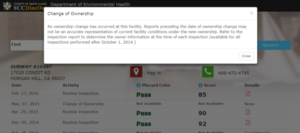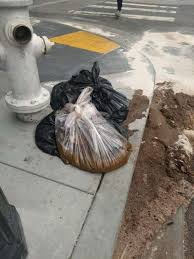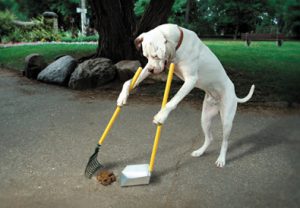Come to Australia, where mandatory display ain’t mandatory.
Bigad Shaban, Liza, Meak, Mark Villarreal of NBC Bay Area report that in the restaurant world, reputation is everything, especially when it comes to health inspection records.
 “We have people’s lives in our hands,” said Alexis Solomou, the owner of Seven Hills in San Francisco. “You could get people very, very sick very, very quickly.”
“We have people’s lives in our hands,” said Alexis Solomou, the owner of Seven Hills in San Francisco. “You could get people very, very sick very, very quickly.”
Solomou’s restaurant boasts a near perfect health inspection score – 98 out of a 100. He says he has worked hard for it and was upset to learn about a loophole that allows restaurant owners in San Francisco to essentially wipe away their old inspection records and health code scores from the city’s website.
“There’s no reason why anybody should hide their health inspection score or wipe it clean unless there’s something they’re trying to hide,” said Solomou.
Websites such as Yelp take restaurant inspection scores from the city’s public database and post them online to give customers easy access to the information. But those scores can’t get posted if the city erases the information from its online database.
In May, the Investigative Unit discovered that the San Francisco Department of Public Health deletes old health inspection records from its website if a restaurant files a change of ownership with the city. The application process costs restaurants roughly $600 in city fees but offers new owners a clean slate so they are not saddled with the old health inspection scores from the previous restaurant owner.
However, the Investigative Unit revealed that even after a restaurant files an ownership change with the city, the same people can continue to run the restaurant as long as the owners list a new corporation name as part of that application.
Even in situations when new restaurant owners are listed in the application, the Investigative Unit discovered those owners are still allowed to work for the same corporation that owned the restaurant previously. So while a restaurant may have strong ties to its previous ownership, San Francisco still agrees to delete that restaurant’s old inspection records from the city’s online database.
That’s exactly what happened at a dim sum restaurant in the Diamond Heights neighborhood. All Season Restaurant, which is officially known as Harbor Villa on city documents, had its history of repeated high-risk violations wiped clean online, even though inspectors found dead cockroaches on utensils and plates.
“It’s not for me to make sense of it; it is what the law requires us to do,” said Stephanie Cushing, director of San Francisco’s Department of Environmental Health.
Cushing and her team of 30 inspectors are in charge of permitting the roughly 7,400 restaurants and caterers throughout San Francisco. In May, Cushing told the Investigative Unit that state and local laws require her department to remove a restaurant’s old inspection records from the city’s website once they file a change of ownership application.
State Law on Restaurant Inspections
That’s simply not true, according to the California Department of Public Health. Nowhere in California’s retail food code does it state a local health department must delete a restaurant’s old health records from its website.
“The law doesn’t specify whether a historical record associated with a prior owner of a business goes with a new company or doesn’t go with a new company,” said Pat Kennelly, California’s Department of Public Health Food Safety Manager. “The law is silent on the issue.”
Kennelly said there is nothing to keep local health departments from shutting down a restaurant for repeated health violations.
“They have the authority under existing law to be able to take action against them, to fine them, penalize them, impound their equipment, impound product, and ultimately suspend or revoke their permits if they can’t comply with the rules,” Kennelly said.
San Francisco’s Department of Public Health stopped including a restaurant’s previous ownership records online about 10 years ago. A spokeswoman for the department said consumers “only wanted to see the most current score.” She went on to say that posting the information now “would make it very difficult for people to navigate.”
That response frustrates Solomou.
“To say that San Francisco diners, in particular, are not savvy enough to digest that information is incorrect,” Solomou said. “I don’t know why anyone would want the wool being pulled over their eyes.”
Solomou said the issue is also one of fairness since his own restaurant’s inspection history is posted online, even though his violations were deemed “low-risk,” including a peeling wall. He wonders why restaurants with far more serious violations are allowed to wipe their records clean, regardless of how dirty those record may have been over the years.
“To think that someone can come in and change their name … and get any blemishes squashed is scary,” Solomou said. “It really is.”
 Dodging human — and sometimes animal — excrement on walkways became a normal part of the 24-year-old’s life in his South of Market neighborhood.
Dodging human — and sometimes animal — excrement on walkways became a normal part of the 24-year-old’s life in his South of Market neighborhood.







.jpg) dehydration, principal Patrick Ruff said.
dehydration, principal Patrick Ruff said.